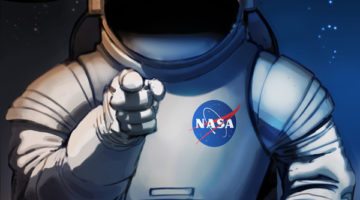
Almost 40 years ago a team of people sat down together to create humanity’s greatest mixtape, a mixtape that is currently floating more than 12 billion miles away from Earth. It’s called the Golden Record and is meant for intelligent extraterrestrial life. That’s right … aliens.
In May 1972 NASA’s Voyager Mission was officially approved. This mission launched two robotic probes, Voyager 1 and Voyager 2, to explore and study the outer solar system, including planets like Jupiter and Saturn, and now interstellar space.
These spacecrafts have been sending new data back to Earth since their launch in 1977 and are expected to continue doing so until 2025, when there will no longer be sufficient energy to power the instruments aboard each vessel.
That won’t be the end for the Voyagers though, because they are not just carrying all of these data-collecting instruments. They’re carrying the whole of humanity with them.
That’s where the Golden Record comes in. A project led by Carl Sagan of Cornell University and a team of people he recruited, the Golden Record was meant to be a time-capsule of humanity. It was meant to be something that, if found, would “communicate a story of our world to extraterrestrials,” according to NASA.
As you can imagine, trying to sum up all of humanity in one record is a daunting task. Over the course of almost a year, Sagan and his team worked to assemble a collection of sounds, music, greetings and pictures.
The records, which are a slightly fancier version of the vinyl classics we all know today, encased in a protective aluminum jacket and plated with gold, contain over 115 images, 90 minutes of music from around the globe and a variety of natural Earth sounds like the chirping of birds and the crashing of waves.
There are also greetings spoken in over 55 languages and printed messages from former U.S. President Carter and U.N. Secretary General Waldheim.
Each record is attached to the Voyagers with a cartridge, needle and symbolic instructions that would tell intelligent life how to play the record and learn about the vast diversity of life on Earth.
Jimmy Carter put it best when he said, “This is a present from a small, distant world, a token of our sounds, our science, our images, our music, our thoughts and our feelings. We are attempting to survive our time so we may live into yours.”
So why am I bringing all of this up now?
Well, as I was on my way to campus last Friday afternoon, listening to NPR as almost all journalism geeks do, I heard about these records for the first time on a program called “Science Friday.”
Not only did I learn about these original time capsules of humanity, but I also heard about a recent campaign by the show to “remake” the records. After a group of panelists sifted through listener suggestions and added their own picks, a final playlist for the new Golden Record was made.
Martin Luther King’s famous “I have a dream speech,” a sound bite of a 4-year-old being tickled, “Good Vibrations” by the Beach Boys, pictures of humans riding bikes and even the entire server of Google are a few of the selections.
As I scrolled through the list, there was a sinking feeling in my stomach. There was something really wrong with the list and the original record from 1977 too.
Where were all of the bad things about humanity?
If in some part of this universe there are other intelligent beings, shouldn’t they know the lousy parts of our culture and life on Earth too?
The world has a bad habit of not acknowledging the negative aspects of life on Earth. There are murders, war, discrimination, disasters, bullying and attacks. The corrupt parts of humanity make up more of our world than we are all willing to admit.
We aren’t accurately depicting what it means to be human if we only include things like the sound of a kiss or a famous Beethoven symphony on our Golden Record. By only highlighting the glittering gold aspects of humanity, we are losing a tremendous part of what actually makes us human.
It’s about time we start addressing the dull, black parts of our world too, because ignoring them or keeping them locked away in a box with no key will not make them go away.
And while we’re at it, maybe we can try to fix more of them. That way if a miracle happens and aliens do find our record and decide to take a trip to our little planet, they will find a world better than the one they learned about, and not worse.
Emily Fisher studies journalism. She can be reached at efisher@sagebrush.unr.edu and on Twitter @TheSagebrush.











